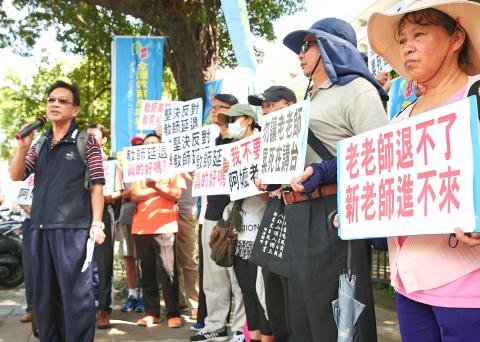The National Federation of Education Unions yesterday rallied outside the Ministry of Education in Taipei to protest a proposal by Democratic Progressive Party Legislator Wang Jung-chang (王榮璋) to push back the legal retirement age for teachers to 65.
Wang, who is a member of the Presidential Office’s National Pension Reform Committee, made the proposal last week.
Minister Without Portfolio Lin Wan-i (林萬億), deputy convener and executive director of the committee, said that having teachers retire later is a global trend and that he would take the proposal to the committee for discussion.

Photo CNA
The Statute Governing the Retirement of School Faculty and Staff (學校教職員退休條例) stipulates that public-school teachers may retire after working for 25 years or when they are 60 years old and have worked for at least five years.
The federation said that teaching is different from other occupations because teachers often have to help students with their studies and contact parents on weekends.
With the supply of teachers already outstripping demand, schools rarely have openings for teaching positions, the federation said, adding that Wang’s proposal would add to the problem and is detrimental to young and inexperienced teachers looking for employment.
A majority of parents said they prefer teachers younger than 55, the federation said.
Taiwan Early Childhood Education Association president Su Yo-cheng (蘇祐晟) said he became a parent at a relatively late stage in his life and that he often finds parenthood tiring.
He raised doubts about whether older teachers would have the mental and physical energy needed to take care of classes.
“I cannot stand that kindergarten teachers are just like grandmothers taking care of their grandchildren,” Su said.
He also took issue with calls to push back the retirement for elementary and junior-high school teachers, saying there could be potential health risks for 65-year-old teachers having to demonstrate how to jump rope to students or dealing with rebellious teenagers.
The protesters urged the government not to make a reckless decision at the expense of teachers, students and parents.
The ministry said the average retirement age of elementary and junior-high school teachers is 53, while that of university professors is 60, adding that the decision on whether the retirement age will be prolonged is to be made in accordance with the committee’s decision.
When reached for comment yesterday, Wang said: “Do teachers give an impression that they are particularly more hard-working than others? I believe that society would have its own judgement.”

Alain Robert, known as the "French Spider-Man," praised Alex Honnold as exceptionally well-prepared after the US climber completed a free solo ascent of Taipei 101 yesterday. Robert said Honnold's ascent of the 508m-tall skyscraper in just more than one-and-a-half hours without using safety ropes or equipment was a remarkable achievement. "This is my life," he said in an interview conducted in French, adding that he liked the feeling of being "on the edge of danger." The 63-year-old Frenchman climbed Taipei 101 using ropes in December 2004, taking about four hours to reach the top. On a one-to-10 scale of difficulty, Robert said Taipei 101

Nipah virus infection is to be officially listed as a category 5 notifiable infectious disease in Taiwan in March, while clinical treatment guidelines are being formulated, the Centers for Disease Control (CDC) said yesterday. With Nipah infections being reported in other countries and considering its relatively high fatality rate, the centers on Jan. 16 announced that it would be listed as a notifiable infectious disease to bolster the nation’s systematic early warning system and increase public awareness, the CDC said. Bangladesh reported four fatal cases last year in separate districts, with three linked to raw date palm sap consumption, CDC Epidemic Intelligence

US climber Alex Honnold left Taiwan this morning a day after completing a free-solo ascent of Taipei 101, a feat that drew cheers from onlookers and gained widespread international attention. Honnold yesterday scaled the 101-story skyscraper without a rope or safety harness. The climb — the highest urban free-solo ascent ever attempted — took just more than 90 minutes and was streamed live on Netflix. It was covered by major international news outlets including CNN, the New York Times, the Guardian and the Wall Street Journal. As Honnold prepared to leave Taiwan today, he attracted a crowd when he and his wife, Sanni,

Taiwanese and US defense groups are collaborating to introduce deployable, semi-autonomous manufacturing systems for drones and components in a boost to the nation’s supply chain resilience. Taiwan’s G-Tech Optroelectronics Corp subsidiary GTOC and the US’ Aerkomm Inc on Friday announced an agreement with fellow US-based Firestorm Lab to adopt the latter’s xCell, a technology featuring 3D printers fitted in 6.1m container units. The systems enable aerial platforms and parts to be produced in high volumes from dispersed nodes capable of rapid redeployment, to minimize the risk of enemy strikes and to meet field requirements, they said. Firestorm chief technology officer Ian Muceus said